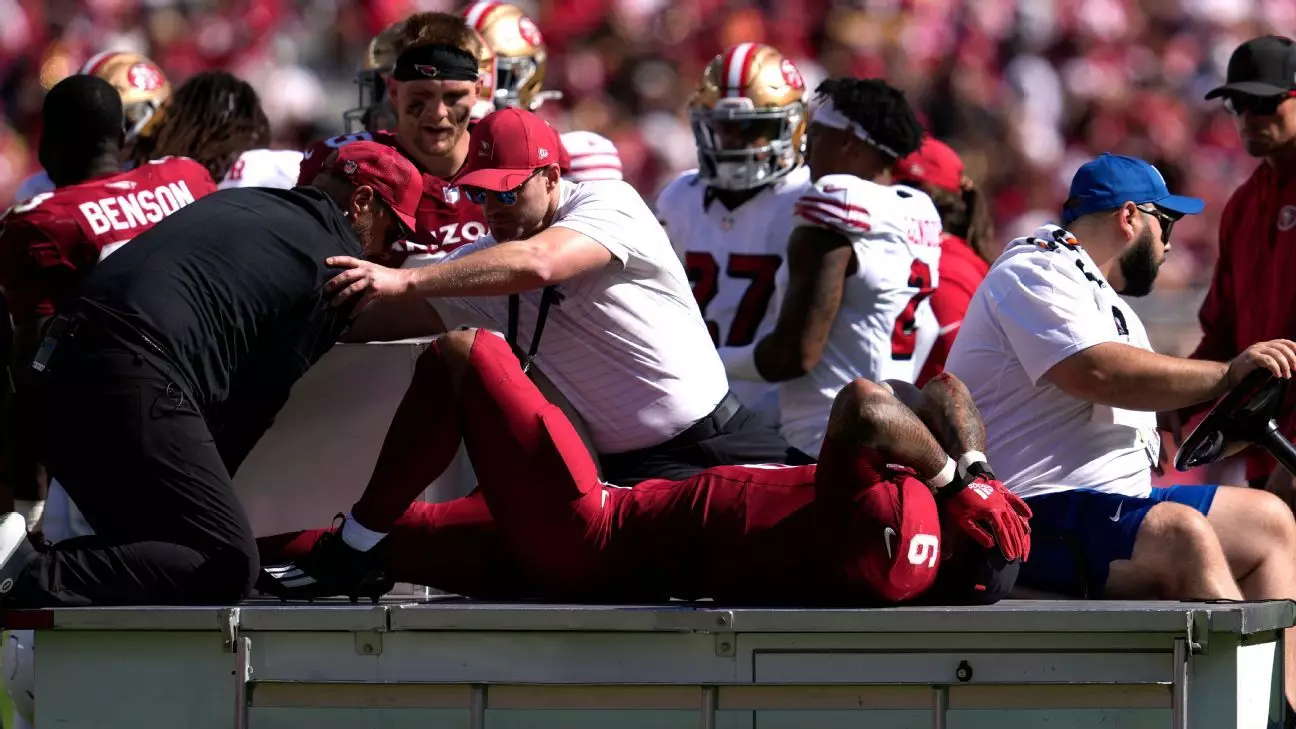The recent injury endured by Arizona Cardinals star James Conner starkly underscores the brutal reality facing professional athletes today. While fans revel in the excitement of high-stakes games, the underlying risk that athletes face is often glossed over. Conner’s devastating ankle injury, which will sideline him for the rest of the season, reveals how unpredictable and unforgiving the sport truly is. No matter how dedicated or physically prepared an athlete might be, the sport’s intensity can turn suddenly lethal, stripping players of their physical prowess and, at times, their careers.
This incident also exposes a broader issue: the ongoing commodification of athletes’ bodies. Conner’s injury wasn’t just a momentary setback but a stark reminder of the fragility that lurks beneath the glamour. It raises questions about whether enough emphasis is placed on player health, safety protocols, and preventative measures. Is the league doing enough to prioritize the well-being of its players, or is the thrill of victory too often prioritized over long-term health? The harsh truth is that damage inflicted on players like Conner persists long after the final whistle, whether physically, psychologically, or financially.
The Impact on the Team and the League’s Moral Dilemma
Conner’s injury didn’t just affect him—it sent ripples through the entire team, shaking their morale and derailing their season’s momentum. From the emotional turmoil experienced by teammates and coaches to the strategic chaos that ensues with the loss of a key player, the injury exposes the cruel unpredictability of football. The scene was heart-wrenching: teammates gathered close, visibly distressed, understanding that their comrade’s career could be in jeopardy.
This episode also exposes the moral dilemma faced by league officials and team management—by continuously demanding more from players, are we contributing to a culture of sacrifice that neglects safety? The league’s emphasis on loud, aggressive gameplay often overshadows consideration for player health. The question, then, is whether the sport’s governing bodies should take a more proactive stance—shifting focus from record-breaking plays to fostering safer playing conditions. If the NFL truly values its athletes, it must confront its own complicity in a culture that prizes entertainment over health.
Leadership and the Future of the Cardinals’ Running Game
The loss of Conner, a versatile and dependable running back, casts a long shadow over the Arizona Cardinals’ immediate prospects. Barring a miraculous recovery, Arizona faces the daunting task of reconfiguring their offense with a depleted backfield. The expected elevation of Trey Benson into a starting role highlights how fragile team strategies can be, especially when a key player is injured unexpectedly. It’s a stark lesson on the importance of depth and resilience in a sport where injuries are almost inevitable.
This situation invites a critical reflection on how teams prepare for adversity. Should franchises be more aggressive in developing their talent pools or perhaps reconsider their approach to managing injuries? While players like Conner have earned their time in the limelight, the harsh reality remains: a team’s success often hinges on its depth and willingness to adapt under pressure. Arizona’s predicament underscores the fundamental truth that talent alone is insufficient—robust preparation, strategic planning, and a commitment to player welfare are equally crucial.
Broader Implications: The Culture of Endurance in Professional Sports
The incident with Conner is emblematic of a broader cultural issue within professional sports—the pervasive glorification of endurance and resilience at the expense of safety. Athletes are often celebrated for their grit and willingness to play through injuries, but this mindset can be dangerously misguided. Society’s obsession with toughness may be fueling a cycle where players feel compelled to ignore pain, risking long-term health for momentary glory.
Instead of fostering a sports culture that venerates sacrifice, there should be a shift toward valuing sustainability. The league and its teams must champion policies that prioritize the well-being of their athletes, advocating for better medical support, more conservative injury management, and a reevaluation of athletic demands. Conner’s injury could serve as a wake-up call—an opportunity to reconsider whether the sport’s demands align with the health and dignity of its most valuable assets: the players.
By critically examining these issues, it becomes clear that professional football, while undeniably entertaining, presents a moral challenge: are we willing to accept the human cost embedded within its spectacle? Conner’s injury is more than a personal tragedy; it’s a reflection of a sport that often balances on the edge of human endurance and systemic neglect. If we want the game to thrive in a moral and sustainable way, it’s time to rethink the values that underpin it.


Leave a Reply